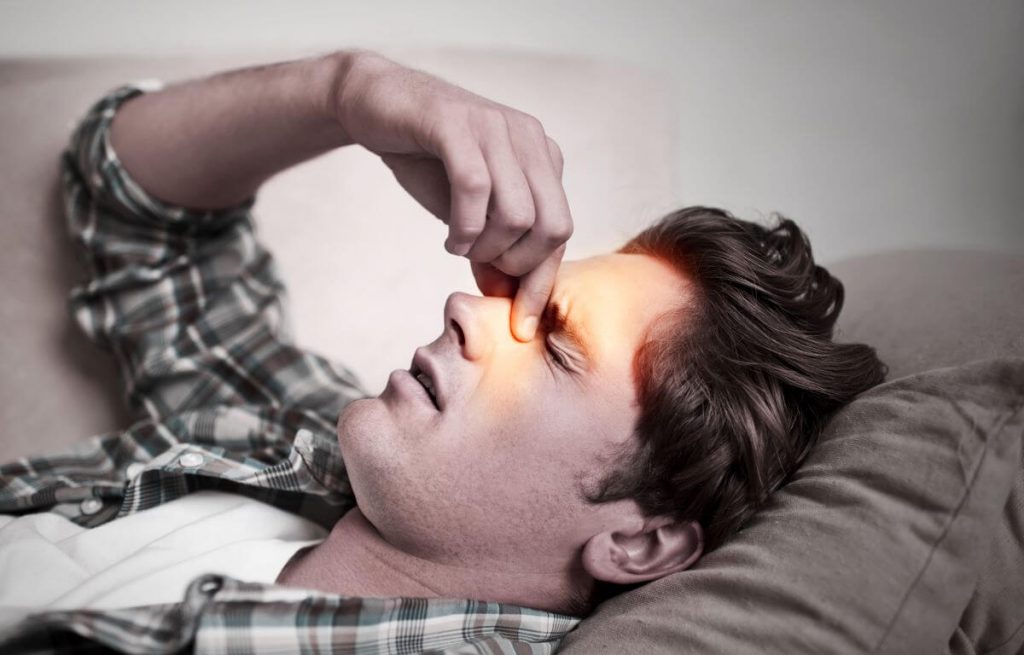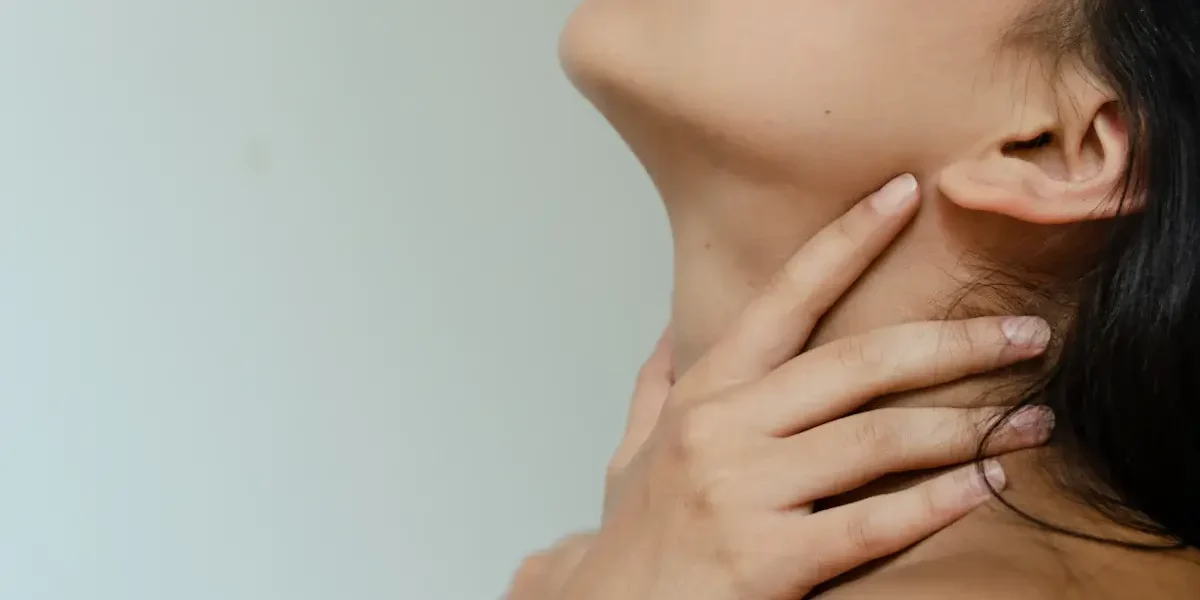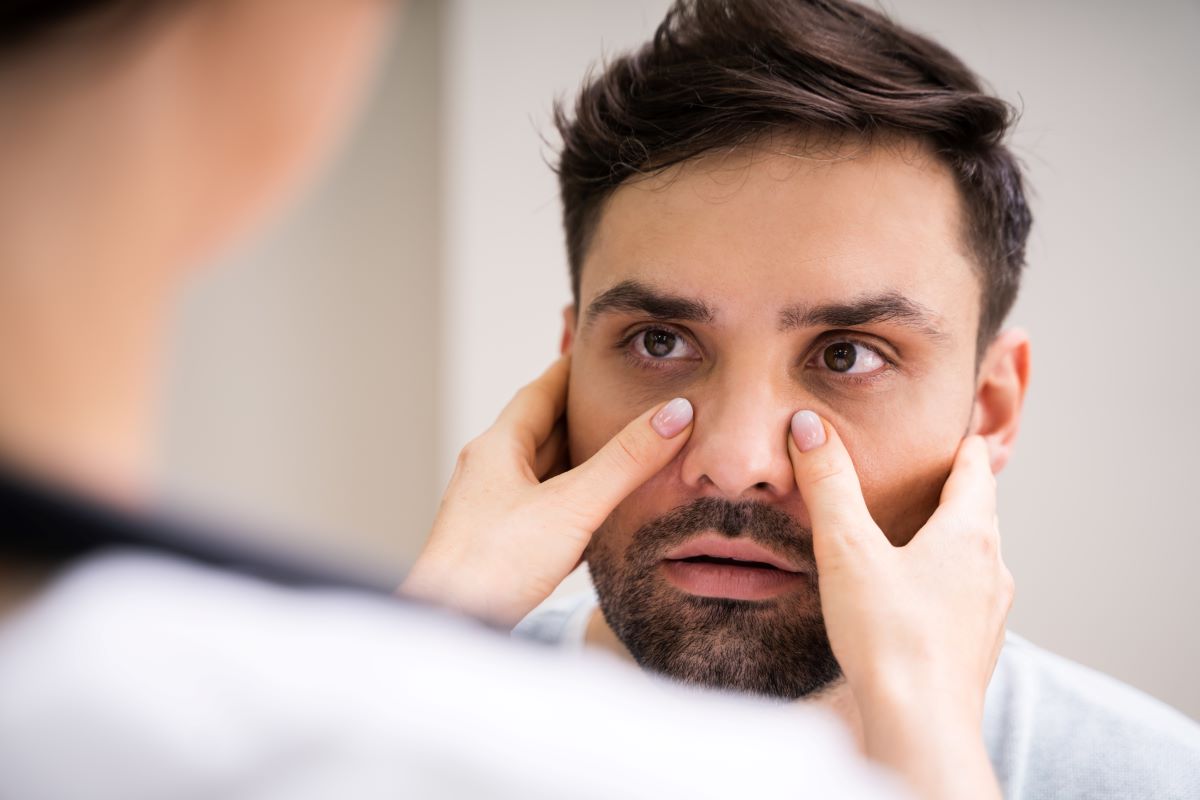If you’re reading this, you or someone you care about might be dealing with chronic sinusitis. Chronic sinusitis can make daily life difficult with symptoms like nasal congestion, headaches, and fatigue. It can feel really overwhelming to have a stuffy nose and other symptoms all the time, but don’t worry!
Dealing with chronic sinusitis can be challenging, but at Pikes Peak ENT, Allergy, and Asthma, we understand your struggle and are here to provide the support you need.
What is Chronic Sinusitis?
Chronic sinusitis occurs when the tissues in your nose and sinuses get swollen, inflamed or sometimes blocked and filled with fluid. This can happen because of infections, like from a virus or bacteria, or other reasons like allergies or nasal polyps. This condition can leave you feeling uncomfortable, tired, and struggling to breathe properly. When this swelling lasts for more than 12 weeks, we call it chronic sinusitis.
The Importance of Sinuses
Before diving deeper into chronic sinusitis, let’s understand why sinuses are important. Sinuses are air-filled spaces in the skull that help to:
- Lighten the weight of the head: Without sinuses, our heads would be much heavier.
- Produce mucus: This mucus traps dust, germs, and other particles, preventing them from getting into our lungs.
- Add resonance to our voice: The sinuses help to produce sound quality when we speak.
When the sinuses are healthy, they are filled with air. But when they get blocked and filled with fluid, they can become infected and cause multiple symptoms affecting your health.
Common Symptoms of Chronic Sinusitis
If you are experiencing chronic sinusitis, you may notice symptoms such as thick, discolored mucus, postnasal drip, nasal congestion, facial pressure or pain, reduced sense of smell or taste, headaches, ear or tooth pain, coughing, sore throat, bad breath, and fatigue.
Some unique chronic sinusitis symptoms you may experience living Colorado Springs could include headaches or worsening symptoms when storms roll over the front range when the weather changes rapidly.
Chronic sinusitis symptoms:
- Thick yellow or green mucus: This can come from your nose or drip down your throat.
- Stuffy nose: A blocked nose makes it hard to breathe.
- Pain or swelling: This can be around your eyes, cheeks, nose, or forehead.
- Trouble smelling and tasting: You might not be able to smell or taste things as well as before.
- Pain in your upper jaw and teeth: Your upper teeth might hurt.
- Ear pain and headache: You might feel pain in your ears or head.
- Coughing more at night: This can disturb your sleep.
- Sore throat and bad breath: Your throat might hurt, and your breath might smell bad.
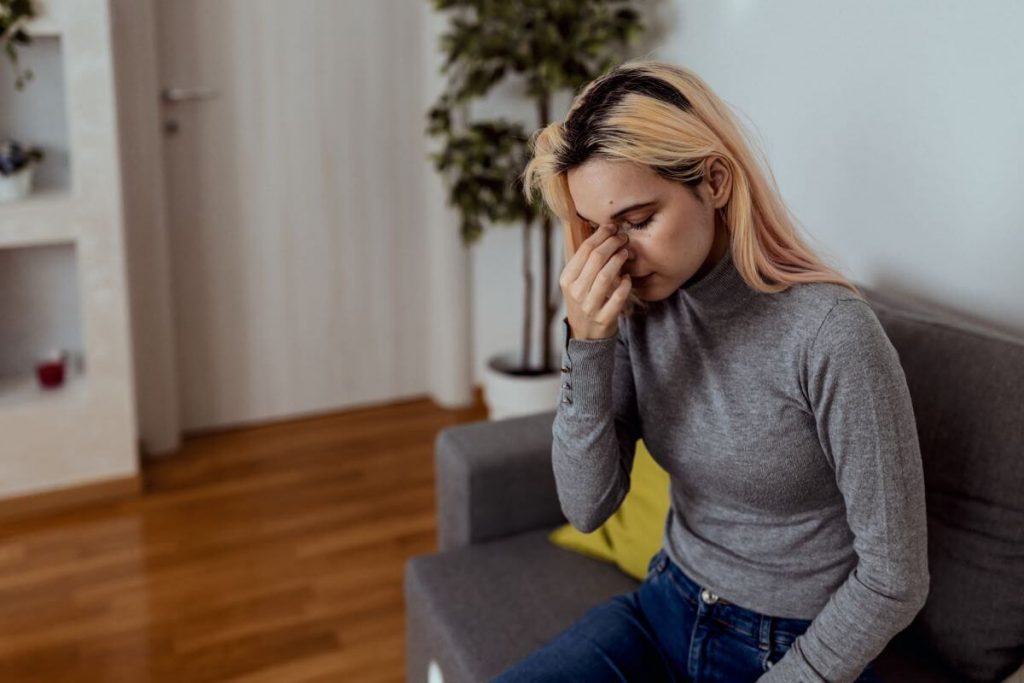
Many people deal with chronic sinusitis, and hearing their stories can help you feel less alone. Here’s a story about Jane:
Jane’s Story: Jane is a teacher in Colorado Springs. She loved her job but found it really hard to teach when she was always dealing with a stuffy nose and headaches. Her students noticed she touched her nose a lot and coughed, especially at night. Jane tried different over-the-counter medicines, but nothing worked for long. She felt tired all the time and had trouble sleeping. When Jane visited Pikes Peak ENT, Allergy, and Asthma, her doctor listened to her story and suggested a treatment plan that finally brought her relief. Jane can now breathe clearly and enjoys teaching her students without any problems.
If you are experiencing from the list above, set up an appointment with one of our chronic sinusitis specialists at Pikes Peak ENT, Allergy and Asthma in the Colorado Springs area and let us help you feel better.
Take Control of Your Health with Personalized Care
Book an appointment today and let us help you breathe easier, hear better, and live more comfortably with our expert ENT, allergy and asthma care
Causes of Chronic Sinusitis
Causes of chronic sinusitis can include infections (bacterial or viral), nasal polyps, a deviated septum, or underlying conditions like asthma or allergies. In Colorado Springs, some unique causes can worsen symptoms such as the dryness, smoke, and weather changes.
Chronic sinusitis can be caused by several factors:
- Infections: Viruses, bacteria, and fungi can cause sinus infections.
- Nasal Polyps: These are growths in the nose that can block the sinuses.
- Deviated Septum: This is when the inside of the nose is crooked, blocking the sinus passages.
- Allergies: Allergies to things like pollen, dust mites, and pet dander can cause inflammation.
- Respiratory Tract Infections: Colds and other infections can inflame and thicken the sinus membranes.
- Other medical conditions: Diseases such as cystic fibrosis, gastroesophageal reflux, or immune system disorders can result in nasal blockage.
Diagnosis of chronic sinusitis
When you visit Pikes Peak ENT, Allergy, and Asthma in Colorado Springs, our specialists will conduct a thorough examination to diagnose your chronic sinusitis. This may involve nasal endoscopy, imaging tests like CT scans or MRIs, and occasionally, a biopsy of sinus tissue. Here’s how we do it:
- Medical History: We’ll ask about your symptoms and health history.
- Physical Examination: We’ll look at your nose, throat, and sinuses.
- Imaging Tests: Sometimes, a CT scan or MRI can help us see the inside of your sinuses.
- Nasal Endoscopy: We use a small camera to look inside your nose and sinuses.
- Allergy Testing: If we think allergies might be causing your symptoms, we may recommend testing as well.
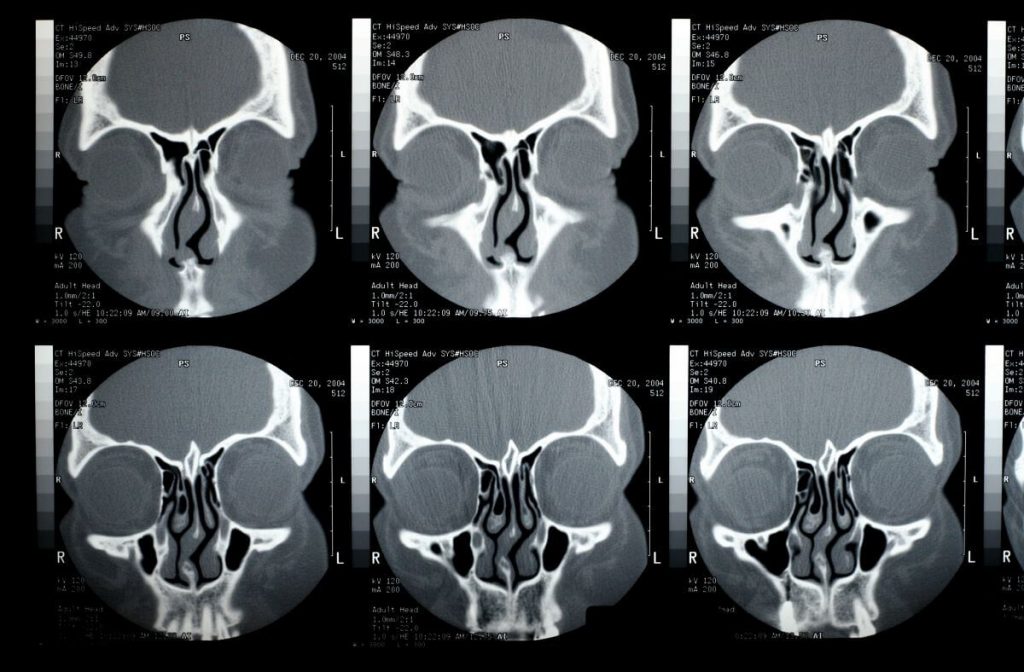
Treatment of Chronic Sinusitis:
At Pikes Peak ENT, Allergy, and Asthma, we use the latest research and technology to treat chronic sinusitis. We stay up to date with new treatments and clinical trials to give you the best care.
Medications and over the counter treatment options
First, we might suggest easy treatments, including medications and even over the counter treatment options such as:
- Antibiotics: If a bacterial infection is present.
- Nasal corticosteroids: To reduce inflammation.
- Decongestants: To relieve congestion.
- Saline nasal irrigation: To rinse away irritants and mucus.
- Pain relief medications: For pain management.
Other surgical and non-surgical options
If these do not fix your sinus symptoms, then it is time to consider other options. These can include surgical and non-surgical options:
- Minimally Invasive Procedures: One of the treatments we offer is called balloon sinuplasty. It’s a simple, in-office procedure that helps open up your sinuses so you can breathe better without much pain.
- More advanced Procedures: For some severe chronic sinusitis cases, advanced treatments and surgical procedures might be necessary. We use tiny cameras and tools to do surgery inside your nose. This can fix sinus problems with less pain and recovery time including:
- Functional Endoscopic Sinus Surgery (FESS): This is a minimally invasive surgery to remove blockages and improve sinus drainage.
- Image-Guided Surgery: Using advanced imaging technology, surgeons can navigate the sinuses more accurately during surgery.
- Biologics Therapy: In some cases, surgical options may not be necessary, and we can use a medical (non-surgical) treatment called biologics which can help treat chronic sinusitis with nasal polyps. Additionally, sometimes these options can be used AFTER surgery to help reduce the risk of the sinusitis returning and needing future surgeries.
John’s Story: John was dealing with chronic sinusitis for years. He tried everything, but nothing seemed to work. It was making his daily life really hard. When he came to Pikes Peak ENT, Allergy, and Asthma in Colorado Springs, the doctors suggested a balloon sinuplasty. John was nervous about the procedure, but it was quick and not very painful. After the procedure, John could breathe much better, and his sinusitis symptoms were almost gone. John was happy with the results
Prevention of Chronic Sinusitis:
What distinguishes the chronic sinusitis care you receive at Pikes Peak ENT, Allergy and Asthma is we don’t just want to fix your problem but also keep you healthy and reduce the risk of your symptoms returning. This includes addressing unique components of having chronic sinusitis in Colorado Springs.
You can lower the risk of getting chronic sinusitis or having symptoms return by:
- Treating allergies and asthma properly: This includes addressing unique Colorado Springs specific allergy and asthma triggers
- Avoid irritating your nose: Stay away from things that trigger your nose like smoke or strong smells
- Reduce infection risk: Washing your hands often can help reduce infections
- Increase moisture and humidity: Using a humidifier and sinus rinses regularly can help reduce chronic sinusitis in the dry climate of Colorado Springs
Conclusion
Chronic sinusitis can be tough, but with the right care and support, you can start feeling better. Our team of specialists at Pikes Peak ENT, Allergy, and Asthma in Colorado Springs provides personalized, high-quality care to meet your unique needs. By working closely with your healthcare team, you can improve your quality of life and breathe easier.
If you’re struggling with chronic sinusitis symptoms or seeking guidance on managing the condition, don’t hesitate to reach out to us at Pikes Peak ENT, Allergy, and Asthma in Colorado Springs. We are dedicated to helping you find relief and improve your overall well-being. Make an appointment today and let us help you breathe easier and live a healthier, happier life.
Sources:
- Verywell Health – Balloon Sinuplasty
- Cleveland Clinic – FESS surgery
- Cleveland Clinic – Balloon Sinuplasty
- Johns Hopkins Medicine – Balloon Sinuplasty Overview
- NYU Langone Health – Chronic Sinusitis Treatment
- Medical News Today – Chronic Sinusitis Causes
- Stanford Medicine – Sinus Surgery Guide
